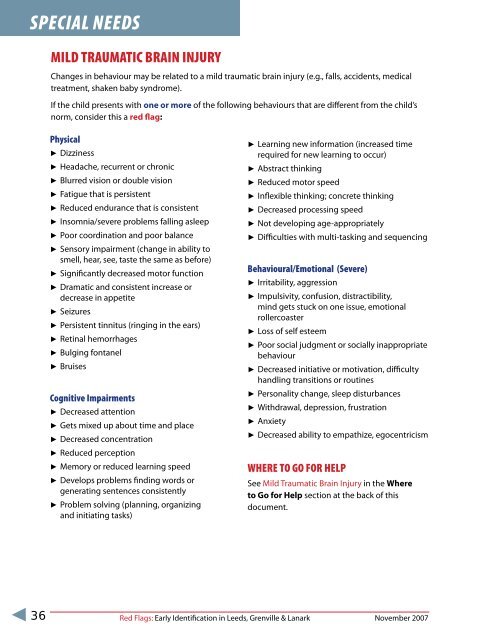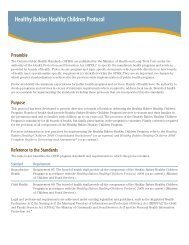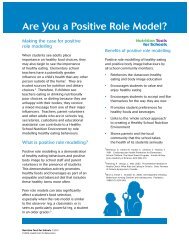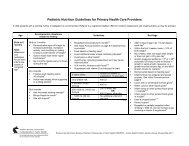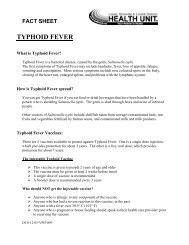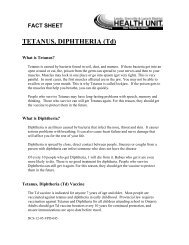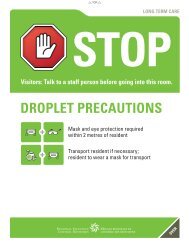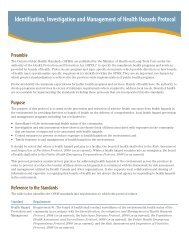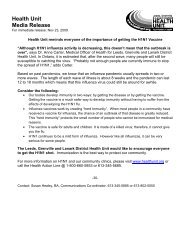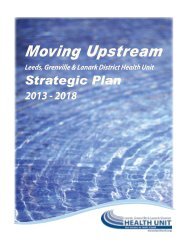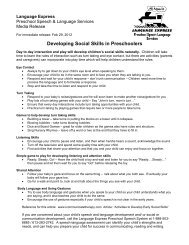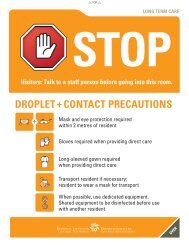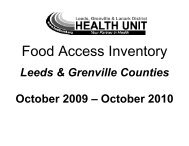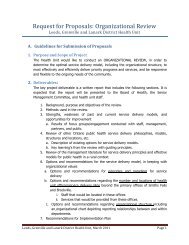Red Flags â - Leeds, Grenville and Lanark District Health Unit
Red Flags â - Leeds, Grenville and Lanark District Health Unit
Red Flags â - Leeds, Grenville and Lanark District Health Unit
Create successful ePaper yourself
Turn your PDF publications into a flip-book with our unique Google optimized e-Paper software.
SPECIAL NEEDS<br />
MILD TRAUMATIC BRAIN INJURY<br />
Changes in behaviour may be related to a mild traumatic brain injury (e.g., falls, accidents, medical<br />
treatment, shaken baby syndrome).<br />
If the child presents with one or more of the following behaviours that are different from the child’s<br />
norm, consider this a red flag:<br />
Physical<br />
►► Dizziness<br />
►► Headache, recurrent or chronic<br />
►► Blurred vision or double vision<br />
►► Fatigue that is persistent<br />
►► <strong>Red</strong>uced endurance that is consistent<br />
►► Insomnia/severe problems falling asleep<br />
►► Poor coordination <strong>and</strong> poor balance<br />
►► Sensory impairment (change in ability to<br />
smell, hear, see, taste the same as before)<br />
►► Significantly decreased motor function<br />
►► Dramatic <strong>and</strong> consistent increase or<br />
decrease in appetite<br />
►► Seizures<br />
►► Persistent tinnitus (ringing in the ears)<br />
►► Retinal hemorrhages<br />
►► Bulging fontanel<br />
►► Bruises<br />
Cognitive Impairments<br />
►► Decreased attention<br />
►► Gets mixed up about time <strong>and</strong> place<br />
►► Decreased concentration<br />
►► <strong>Red</strong>uced perception<br />
►► Memory or reduced learning speed<br />
►► Develops problems finding words or<br />
generating sentences consistently<br />
►► Problem solving (planning, organizing<br />
<strong>and</strong> initiating tasks)<br />
►► Learning new information (increased time<br />
required for new learning to occur)<br />
►► Abstract thinking<br />
►► <strong>Red</strong>uced motor speed<br />
►► Inflexible thinking; concrete thinking<br />
►► Decreased processing speed<br />
►► Not developing age-appropriately<br />
►► Difficulties with multi-tasking <strong>and</strong> sequencing<br />
Behavioural/Emotional (Severe)<br />
►► Irritability, aggression<br />
►► Impulsivity, confusion, distractibility,<br />
mind gets stuck on one issue, emotional<br />
rollercoaster<br />
►► Loss of self esteem<br />
►► Poor social judgment or socially inappropriate<br />
behaviour<br />
►► Decreased initiative or motivation, difficulty<br />
h<strong>and</strong>ling transitions or routines<br />
►► Personality change, sleep disturbances<br />
►► Withdrawal, depression, frustration<br />
►► Anxiety<br />
►► Decreased ability to empathize, egocentricism<br />
WHERE TO GO FOR HELP<br />
See Mild Traumatic Brain Injury in the Where<br />
to Go for Help section at the back of this<br />
document.<br />
36 <strong>Red</strong> <strong>Flags</strong>: Early Identification in <strong>Leeds</strong>, <strong>Grenville</strong> & <strong>Lanark</strong> November 2007


